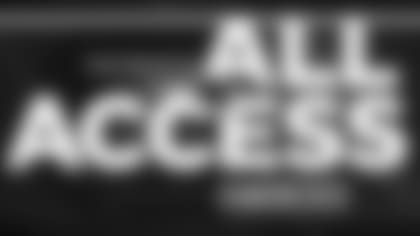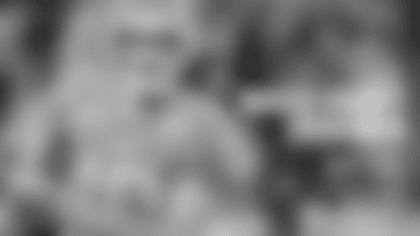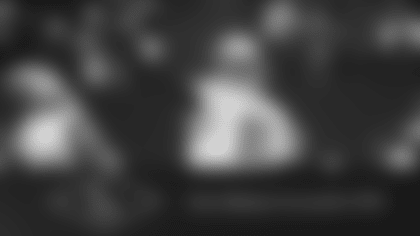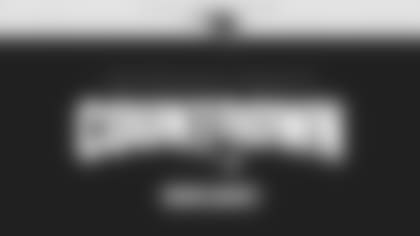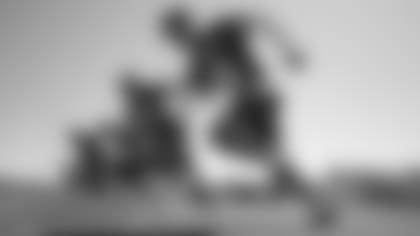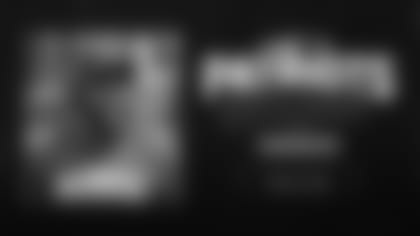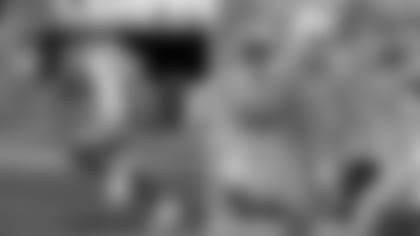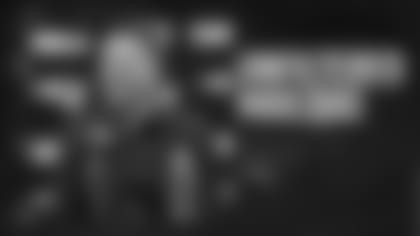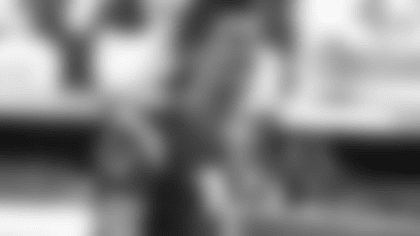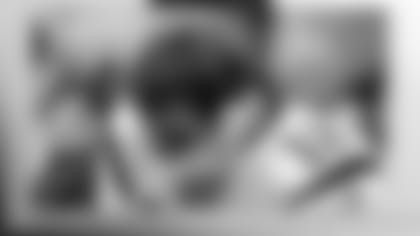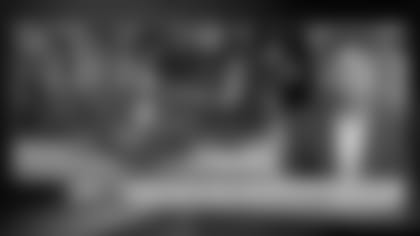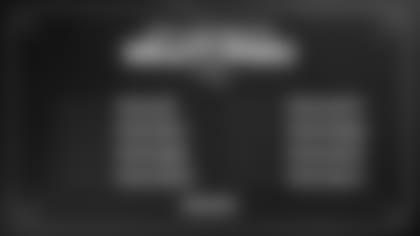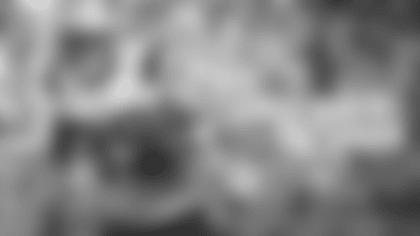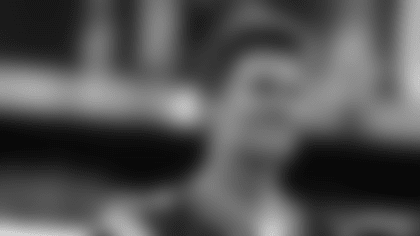Good morning. Nothing really new to report on the roster. Had a crisp workout this morning. We'll take a little bit of time this afternoon to kind of get re-energized, players will come back this evening, we'll meet and we'll start to get ready for the New Orleans practices. They had the game last night, so we'll have the opportunity to take a look at that here over the course of the day and we'll get ready to go for New Orleans starting tomorrow. Hopefully have a couple good days here and then get ready to play on Thursday night.
Q: Will you watch the Saints game from last night as a part of your preparation for Thursday's game?
NC: Well, it will be loaded onto the video system and then once it's on the system we'll go through and just start to look at a few different things at this point.
Q: What do you look at during a preseason game?
NC: Well, really you can start to look at some of the new personnel that maybe they have on their team relative to what you saw last year during the regular season. We have that body of work in film from last year, all their games are on the system, so any changes that they've made, whether it's personnel wise, there may or may not be some things schematically with the new defensive coordinator, Steve Spagnuolo in there, so some of the things that he's doing relative to what maybe they did last year. Any film that you have is good information and it just starts the process just to look at their team, their personnel, what they're doing, etc.
Q: The officials were out there on the practice field for the first time. What do you look to get out of having them out there?
NC: They're here to do their job like players and coaches. They're here to do their job, so whatever job that they have to do, that's what they're here to do. So, they'll make the calls however they do it. We don't really worry about when the officials are here.
Q: Is it more for them than it is for you?
NC: I think it's good for everybody. Maybe in practice if you're going through from a coaching perspective you might not see something that happens, maybe a flinch or something like that, so the official is there to call the fouls, whatever they may be. We encourage them to treat it as if it's a game situation, whether it's holding, hand placement, flinching, illegal contact – you know that's one of the things, especially for the defensive backs, or maybe you have some rookie defensive backs who have an understanding of the 5-yard rule and how it's different relative to what it was in college. There's always a benefit to having another set of eyes that you can talk about the rule. 'Here's what went wrong, here's how we can change it, here's how we can correct it and move forward.'
Q: That's the same this year as it would be last year?
NC: No change. No change.
Q: What kind of role has Chris Simms been helping out with and what is he able to add as a former quarterback in the NFL?
NC: Anytime somebody comes into our system, whether it's in scouting, whether it's in coaching or whether it's a player, they're basically starting from scratch. They're going to learn our system, we're going to teach them our system and the way this place works is everybody gets a lot of exposure to a number of different areas, so from one day to the next it could be one thing and the next day it could be something else. We'll add him to the mix and give him some things to do and see if he can execute those tasks and see how it goes.
Q: Who was the guy working with the quarterbacks today?
NC: Josh [McDaniels]? I mean I didn't see any[one]. Who else?
Q: There was someone who was with them in the corner?
NC: You guys probably got a better piece of that than I did. I didn't see anybody other than Josh. Maybe it was one of the equipment guys out there snapping, I don't know. But yeah, I didn't see anybody.
Q: Bill Belichick tells the story about how he tried Matt Light at right tackle in his first year here and it didn't work out too well. Then he moved him to left tackle and said something like, 'It shows how smart I am.' Is Dan Koppen similar to Matt Light in the sense that he's a center who maybe you could try at guard? Would you try to move him around to try some different combinations?
NC: Sure. Bill has talked about the Light example. Really, since Dan has been in the program, he's basically played center since day one. [Since] he came here he's been on the field in that position and he plays that position well. We work a lot of guys at different spots, [but] that's where Dan's comfort level is and that's what he has the most experience doing. Could he bump over and play guard if necessary? I don't know, I mean, if we had to put him in that situation we'd see how it goes. But he's been a good player at that center position for a long time.
Q: Deion Branch has been limited in recent practices. Prior to that, how do you feel he's been moving and is he still running well at this stage?
NC: Deion had a good offseason. He was here and worked hard. Everybody's at different stages this time of the year. The players that can go out there and practice are out there and those that can't aren't. I wouldn't say it's too different than what it's like during the season: some guys are ready to play, some guys aren't ready to play. In the NFL it's about adjustments, so whatever you have, you coach the players that you have that are on the field; you don't coach another player differently than you'd coach somebody that had been there for a long time. That's the nature of the NFL and it's about adjustment, it's about change and everybody has to handle it and everybody has to deal with it. So that's what we'll do and just take it day-to-day, which is the same thing that we'd do during the course of the week before a game.
Q: How are you feeling about Logan Mankins' progress? Do you think you'll have him for the season or is he a candidate to start the season on the PUP?
NC: We'll see how it goes. He comes in – those guys that come in, they do their treatment every day and then whenever they're ready, the trainers will let us know and then we'll deal with it at that time.
Q: Dan Connolly played a lot of center last year, but he's been playing a lot of guard so far in camp. If he's going to end up playing center during the season, at what point does he need to start getting more reps at center?
NC: Yeah, I mean, I must be watching different film. Dan has been in there quite a bit playing center. I mean, maybe it was earlier in camp, but he's been in there. Those guys, they rotate through – except for I would say [Dan] Koppen – those guys have rotated through on the interior on those inside spots.
Q: Have you seen growth in the chemistry between Brandon Lloyd and Tom Brady?
NC: I think since Brandon's been here day one he's done a great job. And any new player, whether it's a veteran or a rookie, they're all starting essentially from the same point. It's a new system to a degree, even if you've played in this offense; you're really starting from the same spot. So he's come in, he's worked hard, he's done the things we've asked him to do. It takes time. That's why you go out there to practice, you go watch the film, you have communications, whether it's the receiver position, the tight end position, the running back position. 'Ok here's what I saw, here's the technique of the defender, here's what you need to do on this route.' So it's a matter of doing things over and over so that when you get to those game situations, each play, whether it's a quarterback and tight end or a quarterback and a receiver, they have an understanding and anticipation of what they're going to do in that particular situation. It's hard to simulate every look that you're going to see in a game, but you try to work at it as much as you can and make sure there's a constant dialogue back and forth.
Q: Is Nate Solder ahead of the curve right now? Where did you expect him to be two years out when you drafted him?
NC: We thought Nate was a good football player when we drafted him and he's come in and you know he had a decent first year. The most important thing with any player is you're just trying to continue to improve on a day-to-day basis and become a more consistent player, whether it's your techniques, your fundaments or whatever it may be. Our expectations are the same for any player that comes in here: drafted, undrafted, veteran or free agent; it doesn't really change.
Q: When you're out at practice and you see guys go down, like some of the offensive linemen this week, are you already making calls, or is Bill Belichick contacting you saying, 'We're going to need some guys?'
NC: Every day you're talking through personnel, whether it's your personnel or whether it's personnel that might be out there. You just take it on an as needed basis. You only have so many roster spots available, so you're going to have 90 players that are on your roster at any point in time. If you're going to bring somebody else in then you're going to have to drop somebody else. So you're trying to balance a number of different dynamics, but like I said, it's all about you just adjusting and whoever that next guy is, he goes in there and tries to take advantage of his snaps and it just creates more opportunity for somebody else that might not be able to get it if somebody else were in there. That's just part of the NFL. That's just the way it goes and I wouldn't say there's any sort of panic or anything like that. You just take it as it comes and you deal with it.
Q: When you're out at practice what are you looking for?
NC: It's hard to watch everything. You try to just watch both sides of the ball to a degree. You might have an idea based on the script where the play is going to go, what the player is supposed to do on each side of the ball and you can see whether or not they're able to execute that. You might see one thing on the field, but then you go back and watch the film and you see something else that you didn't see. It's really more of a big picture, just really looking at the execution and if you want to focus in on one particular player you can do that, but the big thing you try not to watch is, 'O,k one play this guy got the ball thrown over his head for a touchdown. Is it his fault? Was it the communication?' There are a number of things that you look at, but you're evaluating so many different things: you're evaluating the scheme, the execution and the personnel. That's why we spend so much time. You practice, you watch the film, you watch the film probably two or three times – the same practice – and that's just part of the process.
Q: As a personnel guy, are you watching from the perspective of, 'These guys are struggling, I may need to have to go find someone else?'
NC: I'd say this time of the year you haven't really gotten into any game situations, so you really don't get into that as much I would say.
Q: How much has the new CBA affected you in terms of replacing players who get hurt and having those who haven't been to camp yet have to wait three days until they can be in pads?
NC: It really hasn't changed how we approach it. Whatever rules are in place, then we just comply with them and deal with them and move on. That's all we can do.
Q: Brandon Bolden and Justin Francis are two of your undrafted rookies. Can you describe why they didn't get drafted and what you saw in them?
NC: There are cases like that every year there with players who you sit there and say, 'Well how did Arian Foster not get drafted?' There are multiple examples. Both of those players were productive players. Brandon was pretty productive at Ole' Miss against good people. Had some injuries a little bit his senior year, but he was a productive player: big, strong, caught the ball well, a good runner. Justin was a pretty versatile player. They actually played him as a three-technique and he actually played a little one-technique, kind of played inside defensive tackle and he played some on the perimeter as well and the line of scrimmage. [He's] a disruptive player who played a hundred miles an hour with a non-stop motor. There are cases like that every year and you just kind of scratch your head and say, 'Well, how come he didn't get drafted?' I don't know, that's just the way it goes sometimes. I think you can find players just about anywhere: through the draft, any round, not drafted. That's just the way – with personnel and scouting – that's just the way it goes.
Q: Are you excited to see how your retooled secondary stacks up against Drew Brees and the Saints offense?
NC: The Saints in general, it's a good football team. They won 14 games last year and were a play or two away from going to the NFC Championship game. Offensively, they're very balanced and diverse. They run the ball, the running backs are very involved in the passing game, they're good in the screen game, they've got a very good tight end, good receivers and defensively they've got a lot of disruptive players on their front seven. From a team perspective, it's a good challenge for us to see kind of where we are at this point relative to, I'd say, one of the better teams in the NFL. So it's exciting for all of us, players, coaches, personnel staff, because you get to kind of see a little bit of everything and just to kind of get a barometer of where your team might be at this point.
Q: Do you and your staff look at players on the bottom of your preseason opponents' rosters – particularly those that you have joint practice with – who might get released?
NC: We talked a little bit about this last week [in the press conference]. Anytime you have an opportunity to evaluate some players up close that you normally wouldn't get a chance to, you get to see their practice habits, you get to see them in an individual drill, maybe do something that you can't necessarily see them do on the field. It's a good opportunity for everybody. The reality is they're going to have players that, at the end of the month, they're going to get released and some players may fit for us and some don't, but that's just part of the process that you have to go through. We'll go through it just like every other scouting staff goes through.
Q: Is it easier to see if they would be a fit having played against them?
NC: Well, you can study the player a little bit more thoroughly and have maybe a better understanding of their habits, their drills, their intensity, their effort. When you're watching them play during the preseason, you can't really see how they practice. I would say that's probably one of the benefits of doing something like this jointly.
Q: Can I ask you a rules and procedural thing?
NC: Call the league [laughs]. They're a better resource than I am.


